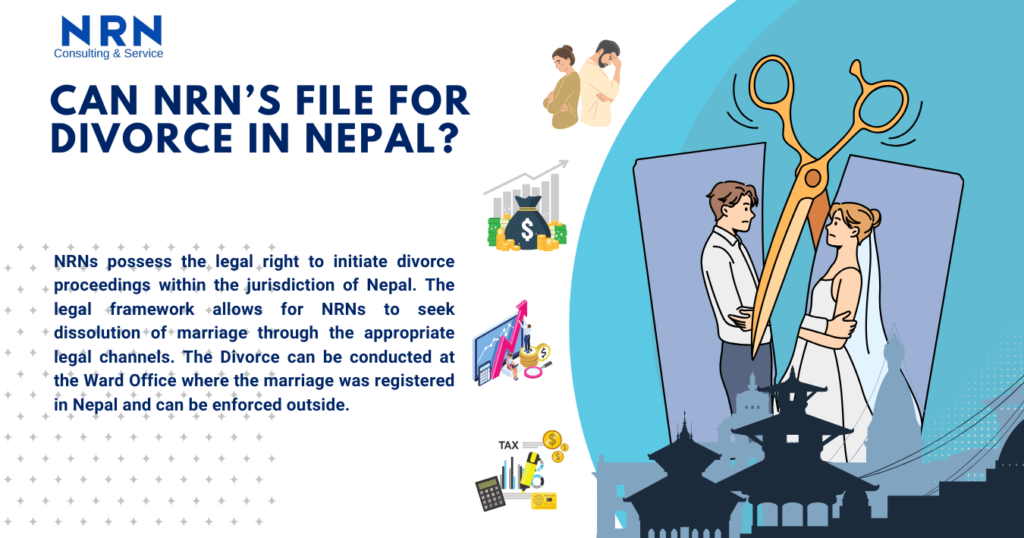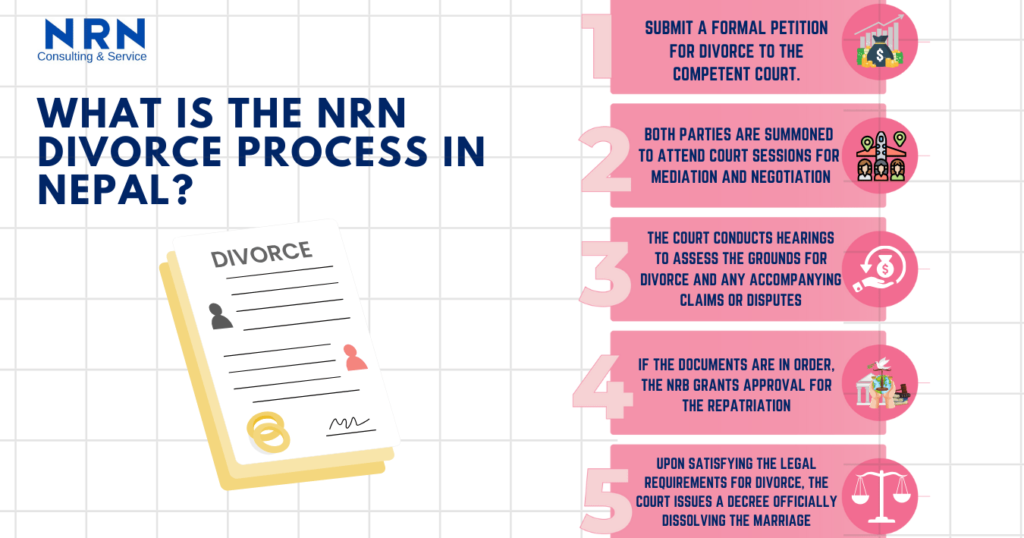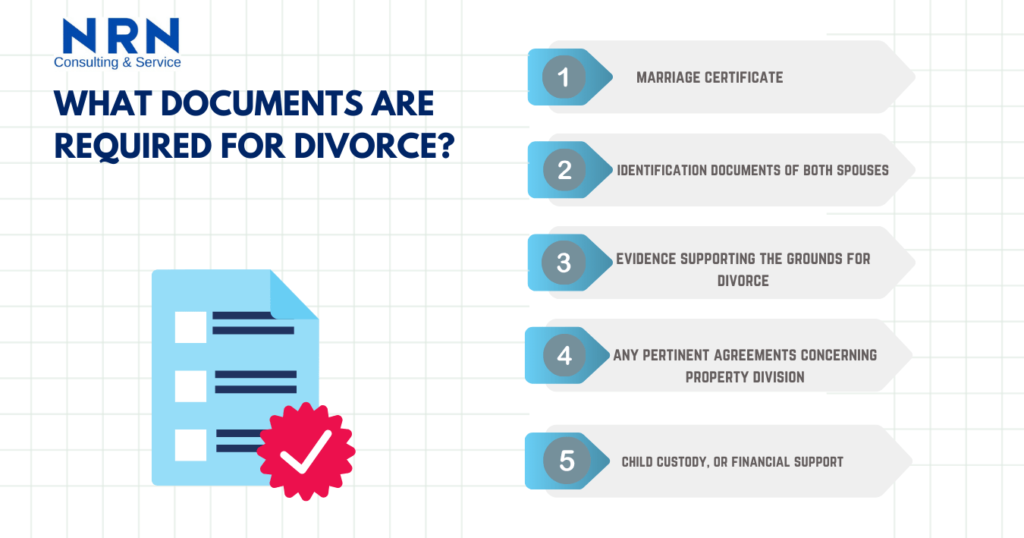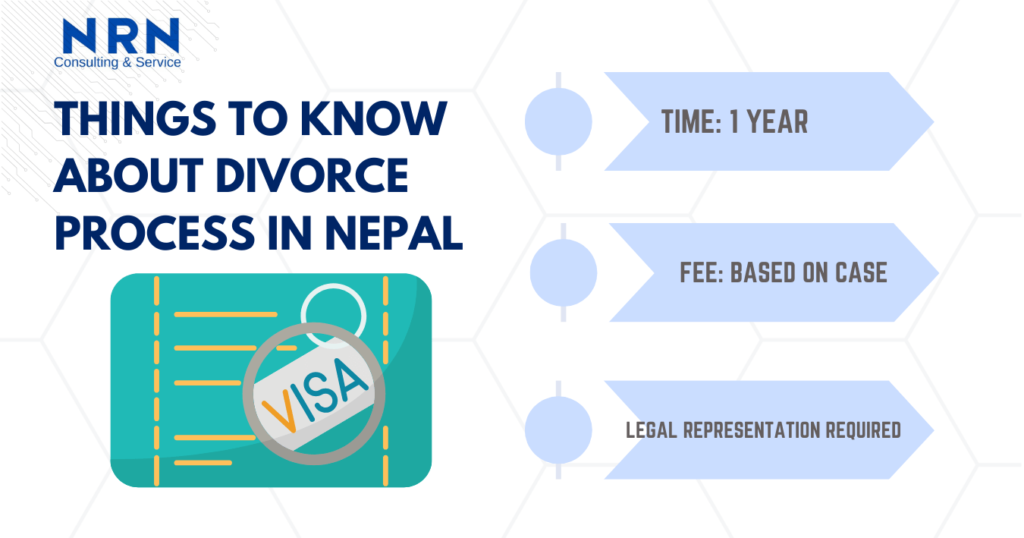NRN Divorce Process in Nepal
NRN Services & Consulting has the best NRN Divorce Lawyers in Nepal with continuous and ongoing experience in conducting divorce in Nepal. This Article has covered the details, procedure, documents and requirements for conducting Divorce in Nepal.
Can NRNs file for divorce in Nepal?

NRNs possess the legal right to initiate divorce proceedings within the jurisdiction of Nepal. The legal framework allows for NRNs to seek dissolution of marriage through the appropriate legal channels. The Divorce can be conducted at the Ward Office where the marriage was registered in Nepal and can be enforced outside.
What is the NRN Divorce Process in Nepal?
The Process of Divorce in Nepal for a Non-Resident Nepali are:
Initially, the petitioner, whether an NRN or a resident, must submit a formal petition for divorce to the competent court.
Subsequently, both parties are summoned to attend court sessions for mediation and negotiation, with the objective of reaching a mutually acceptable settlement.
If reconciliation proves unfeasible, the court conducts hearings to assess the grounds for divorce and any accompanying claims or disputes.
Ultimately, upon satisfying the legal requirements for divorce, the court issues a decree officially dissolving the marriage.

What documents are required for divorce?
Divorce Proceedings require multiple documents such as marriage certificate, identification documents of both spouses, evidence supporting the grounds for divorce (such as testimonies or documentation of irreconcilable differences or marital misconduct), and any pertinent agreements concerning property division, child custody, or financial support.

Are there residency requirements for divorce?
In Nepal, residency requirements for divorce are not explicitly stipulated in the legal framework. Any individual Regardless of residency status, individuals, including NRNs, can file for divorce within Nepal’s jurisdiction if the marriage itself was conducted within Nepal either traditionally or through Court.
How long does divorce take?
The duration of a divorce process in Nepal can vary depending on several factors, including the complexity of the case and whether the divorce is conducted with Mutual Consent or not. Typically, uncontested divorces may be finalized more swiftly, whereas contested cases involving disputes over property, child custody, or other issues may take longer to resolve. On average, the divorce process in Nepal can range from several months to a year or more.
Can divorce be done online?
In the modern context, Divorce Proceedings cannot be conducted online. NRN Services & Consulting provides Online Divorce Consultation services throughout Nepal. The Exchange of Documents, Legal Strategy and Consulting can be facilitated through online channels, such as submitting initial petitions or accessing information, the formal divorce process itself typically requires physical presence in court for hearings, mediation, and other legal proceedings. Thus, divorce cannot be fully conducted online in Nepal at this time.
What are the legal grounds for NRN divorce in Nepal?
The legal grounds for divorce vary by jurisdiction but typically include factors such as irreconcilable differences, adultery, abandonment, cruelty, and prolonged separation.
In some regions, a “no-fault” divorce option exists, where neither party needs to prove wrongdoing. Instead, they can cite irreconcilable differences or an irretrievable breakdown of the marriage. In the context of Nepal, both Female and Male can file divorce in accordance with the National Civil Code, 2074.

How to hire a divorce lawyer?
NRN Services & Consulting facilitates the best Divorce Lawyers for NRN’s in Nepal. To hire a divorce lawyer, one should conduct thorough research to identify experienced attorneys specializing in family law. Recommendations from trusted sources, such as friends, family, or legal professionals, can be invaluable. Consultations with potential lawyers allow individuals to assess their expertise, communication style, and compatibility
Are there divorce fees?
Yes, divorce fees typically include legal fees, court filing fees, and potentially other associated costs. Legal fees vary depending on the complexity of the case, the attorney’s experience, and the duration of the proceedings. Court filing fees are mandatory charges imposed by the jurisdiction for filing divorce petitions and other necessary documents. Additional expenses may arise for services such as mediation, expert witnesses, and court appearances.
How to handle child custody issues?
Firstly, communication and negotiation between parents or guardians are essential to reach an amicable agreement. If an agreement cannot be reached, seeking mediation or legal counsel may be necessary. During court proceedings, presenting evidence of each parent’s ability to provide a stable and nurturing environment for the child is crucial. Factors such as the child’s relationship with each parent, their emotional and physical well-being, and their educational and social needs are considered in determining custody arrangements.
Can NRNs get alimony?
Non-Resident Nepalis (NRNs) may be eligible to receive alimony depending on the laws governing divorce and spousal support in their country of residence or the jurisdiction where the divorce is filed. Alimony, also known as spousal support or maintenance, is typically awarded to provide financial assistance to the spouse with lower earning capacity following divorce. Factors such as the duration of the marriage, each spouse’s financial situation.
What are the property division rules?
Property division rules vary by jurisdiction but generally involve equitable distribution or community property principles. Community property states divide marital assets equally between spouses, regardless of individual contributions or earning capacity
The Complete list of all joint assets including real estate, investments, bank accounts, and personal property must be made along with the assessment of the value of each asset. Collaborative negotiation between spouses can facilitate agreements on asset division outside of court, minimizing conflict and legal expenses. If an agreement cannot be reached, mediation or arbitration may offer alternative dispute resolution methods.
Are there any mediation services?
Yes, mediation services are available to assist divorcing couples in resolving disputes outside of court through facilitated negotiation and communication. The Couple n Nepal should try to reach mutually acceptable agreements on issues such as child custody, visitation, spousal support, and property division.
Can NRNs appeal divorce decisions?
Non-Resident Nepalis (NRNs) may have the right to appeal divorce decisions depending on the laws governing appeals and the specific circumstances of the case. Grounds for appeal may include errors in legal procedure, misinterpretation of law, or newly discovered evidence that could impact the outcome of the case.
What are the rights of NRNs in divorce?
The rights of Non-Resident Nepalis (NRNs) in divorce proceedings depend on various factors, including the laws of the jurisdiction where the divorce is filed and any prenuptial or postnuptial agreements in place. NRNs typically have the right to equitable distribution of marital assets, fair treatment in child custody matters, and access to legal representation. However, the specific rights afforded to NRNs may vary depending on their residency status, citizenship, and the applicable laws governing divorce.

How to resolve divorce disputes?
Divorce disputes can be resolved through various methods, including negotiation, mediation, collaborative law, and litigation. Negotiation involves direct communication between spouses to reach agreements on issues such as child custody, support, and property division. Mediation involves a neutral third party facilitating discussions and helping parties reach mutually acceptable resolutions.
Can NRNs get a mutual consent divorce?
Non-Resident Nepalis (NRNs) may be able to obtain a mutual consent divorce depending on the laws governing divorce in the jurisdiction where the divorce is filed.
Mutual consent divorce typically requires both spouses to agree to the dissolution of the marriage and to terms such as child custody, support, and property division.
NRNs seeking a mutual consent divorce should consult with an attorney familiar with the laws applicable to NRNs in the relevant jurisdiction to understand the requirements and procedures for obtaining a mutual consent divorce.
Conclusion
Non-Resident Nepalis (NRNs) possess the legal right to file for divorce in Nepal, with proceedings conducted at the Ward Office where the marriage was registered. The divorce process entails submitting a formal petition, attending mediation sessions, and obtaining a decree from the court. Required documents include marriage certificates, identification, and evidence supporting grounds for divorce.
Nepal’s legal framework does not impose residency requirements for divorce. The duration of divorce varies based on factors like complexity and mutual consent. NRNs can’t conduct divorce proceedings online but can avail online consultation services.
They may appeal divorce decisions based on legal grounds. NRNs have rights to equitable distribution, child custody, and legal representation. Disputes can be resolved through negotiation, mediation, or litigation, and NRNs may obtain mutual consent divorce if agreed upon.
FAQs
Can NRNs file for divorce in Nepal?
Yes, NRNs can initiate divorce proceedings in Nepal, with the divorce conducted at the Ward Office where the marriage was registered.
What is the NRN Divorce Process in Nepal?
Step 1: Legal Consultation with NRN Services & Consulting
Step 2: Filing a Petition for Divorce
Step 3: Attend Mediation and Negotiation Sessions
Step 4: Court Hearings and Reply of Petition
Step 5: Court Decision to dissolve marriage
What documents are required for divorce?
The Documents required for NRN Divorce Process in Nepal are: Marriage certificate, identification documents, evidence supporting the grounds for divorce, and agreements on property division, child custody, or financial support.
Are there residency requirements for divorce?
No, residency requirements are not explicitly stipulated in Nepal's legal framework. NRNs can file for divorce in Nepal if the marriage was conducted within Nepal.
How long does divorce take?
The duration varies depending on case complexity and whether the divorce is uncontested or contested. It can range from several months to over a year. Divorce with Consent usually takes 2 Days.
Can divorce be done online?
No, the formal divorce process in Nepal requires physical presence in court. However, online consultation services are available.
What are the legal grounds for NRN divorce in Nepal?
Grounds include irreconcilable differences, adultery, abandonment, cruelty, and prolonged separation.
How to hire a NRN divorce lawyer?
Conduct thorough research, seek recommendations, and consult with potential lawyers to assess expertise and compatibility. A
